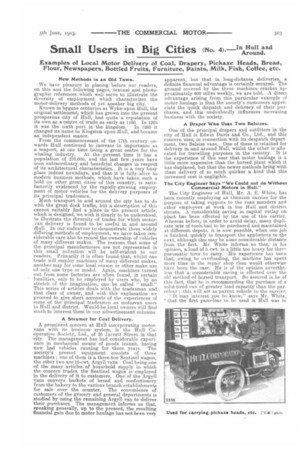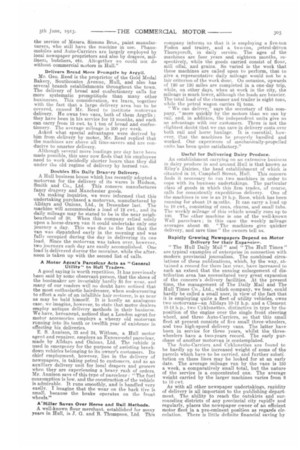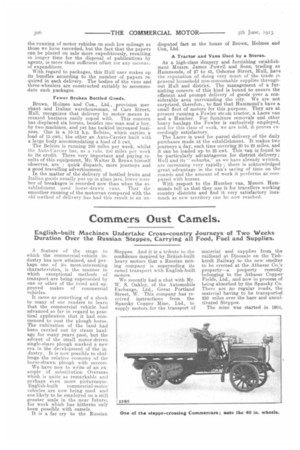Small Users in Big Cities (No 4) In Hull and . ' Around.
Page 5

Page 7

Page 8

If you've noticed an error in this article please click here to report it so we can fix it.
Examples of Local Motor Delivery of Coal, Drapery, Pickaxe Heads, Bread, Flour, Newspapers, Bottled Fruits, Furniture, Paints, Milk, Fish, Coffee, etc.
New Methods in an Old Town.
We have pleasure in placing before our readers, on this and the following pages, textual and photographic references which well serve to illustrate the diversity of employment which characterizes the motor-delivery methods of yet another big city. Known in bygone centuries as Wyke-upon-Hull, the original settlement, which has grown into the present prosperous city of Hull, had quite a reputation of its own as a centre of trade as early as 1160. In 1205 it was the sixth port in the kingdom. ID 1293 it changed its name to Kingston-upon-Hull, and became an independent manor.
From the commencement of the 17th century onwards Hull continued to increase in importance as a seaport, at one time being a great centre for the whaling industry. At the present time it has a population of 270,000, and the last few years have seen extraordinary and beneficial changes in respect of its architectural characteristics. It is a very busy place indeed nowadays, and that it is fully alive to modern business methods, which have taken such a hold on other great cities of this country, is satisfactorily evidenced by the rapidly-growing employment of motor vehicles for the delivery purposes of its principal tradesmen.
Much transport in and around the city has to do with the great dock traffic, but a description of this cannot suitably find a place in the present article, which is designed, we wish it clearly to be understood, to illustrate the diversity of trades for which motorwan delivery is found to be useful in and around Hull. In our endeavour to demonstrate these widely differing methods of employment, we have taken considerable care also to record the ownership of vehicles of many different makes. The reasons that some of the principal manufacturers are not represented in this small collection will be self-evident to our readers. Primarily it is often found that, whilst one trade will employ machines of many different makes, another may for some local reason or other make use of only one type or model. Again, machines turned out from some factories are often found, in certain localities, only to be employed by users who, by no stretch of the imagination; can be called " small." This series of articles deals with the tradesman and that class of owner, and with this explanation we proceed to give short accounts of the experiences of some of the principal tradesmen as motorvan users in Hull and district. Would-be local owners will find much to interest them in our advertisement columns.
A Steamer for Coal Delivery.
A prominent concern at Hull incorporating motorvans with its business system, is the Hull Cooperative Society, Ltd., of 26 Jarratt Street in that city. The management has had considerable experience in mechanical means of goods transit, having now had vehicles running for three years. The society's present equipment consists of three machines; one of them is a three-ton Sentinel wagon, the other two are 15-cwt. Argyll vans. Coal being one of the many articles of household supply in which the concern trades, the Sentinel wagon is employed in the delivery of it to customers. One of the Argyll vans conveys baskets of bread and confectionery from the balery to the various branch establishments for sale over the counter. The convenience of customers of the grocery and general departments is studied by using the remaining Argyll van to deliver their purchases. The management informs us that, speaking generally, up to the present, the resulting financial gain due to motor haulage has not been very apparent, but that in long-distance deliveries, a definite financial advantage is certainly secured. The ground covered by the three machines reaches approximately 600 miles weekly, we are told. A direct advantage arising from this particular example of motor haulage is that the society's customers appreciate the quick dispatch and delivery of their purchases, and this undoubtedly influences increasing business with the society.
A Draper Who Uses Two Belsizes.
One of the principal drapers and outfitters in the city of Hull is Edwin Davis and Co., Ltd., and this concern uses, in connection with its despatch department, two Belsize vans. One of these is retained for delivery in and around Hull, whilst the other is allocated for travelling purposes in the country. It is the experience of this user that motor haulage is a little more expensive than the horsed plant which it has displaced, but that the newer methods bring with them delivery of so much quicker a kind that this increased cost is negligible.
The City Engineer Says "We Could not do Without Commercial Motors in Hull."
The City Engineer of Hull, Mr. A. E. White, has been recently employing an Uranium carrier for the purpose of taking supplies to the road menders and other employees at work in the Hull and district streets. A considerable saving in capital outlay on plant has been effected by the use of this carrier. Whereas before, in order to avoid delay, many duplicate sets of tools had to be purchased and maintained at different depots, it is now possible, when one job is finished, quickly to transport the appliances to the next, although this may be some considerable distance from the first. Mr. White informs us that, in his opinion a load of 5 cwt. is a little too heavy for three pneumatic tires to carry. His experience has been that, owing to overloading, the machine has spent more time in the repair shop than would otherwise have been the case. He is of the opinion nevertheless that a considerable saving is effected over the old method of horsed transport. So assured is he of this fact, that he is recommending the purchase of a solid-tired van of greater load capacity than the parcelear ; this will act as parent vehicle to the carrier.
" it may interest you to know," says Mr. White, " that the first parcPlear to be used in Hull was in the service of Messrs. Sisson& Bros., paint manufacturers, who still have the machine in use. Phanomobiles and Auto-Carriers are largely employed by local newspaper proprietors and also by drapers, milliners, butchers, etc. Altogether we could not do without commercial motors in Hull."
Delivers Bread More Promptly by Argyll.
Mr. Geo. Reed is the proprietor of the Gold Medal Bakery, Southeoates Avenue, Hull, and also has several branch establishments throughout the town. The delivery of bread and confectionery calls for more systematic promptitude than many other businesses. This consideration, we learn, together with the fact that a large delivery area has to be covered, caused Mr. Reed to institute motorvan delivery. He owns two vans, both of them Argylls they have been in his service for 12 months, and each can carry from 15 cwt. to 1 ton of bread and confectionery. The average mileage is 200 per week,
Asked what special advantages were derived by him from delivery by motor, Mr. Reed replied that the machines are above all time-savers and are conducive to smarter delivery. Although several more loadings per day have been made possible, this user now finds that his employees need to work decidedly shorter hours than they did under the old regime of delivery by horsed van.
Doubles His Daily Drewry Delivery. A Hull business house which has recently adopted a motorvan for the delivery of its wares is Hudson, Smith and Co., Ltd. This concern manufactures fancy drapery and Manchester goods. On making inquiries, we were informed that this undertaking purchased a motorvan, manufactured by 11.11days and Onions, Ltd., in December last. The machine will accommodate a load of 12 cwt., and its daily mileage may be stated to be in the near neighbourhood of 30. When this company relied solely upon a horse-drawn van it could undertake only one journey a day. This was due to the fact that the van was dispatched early in the morning and was fully occupied during the day in delivering its one load. Since the motorvan was taken over, however, two journeys each day are easily accomplished. One load is delivered during the morning, while the afternoon is taken up with the second list of calls.
A Motor Agent's Parcelear Acts as "General Utility" to Hull Traders A good saying is worth repetition). It has previously been said by some observant person, that the shoes of the bootmaker are invariably hardly fit for wear, and many of our readers will no doubt have noticed that the most enthusiastic hairdresser, when endeavouring to effect a sale of an infallible hair restorer, is as near as may be bald himself. It is hardly an analogous case, we imagine, however, to state that motor dealers employ antique delivery methods in their business, We have, hereanent, noticed that a London agent for motor accessories employs a wheezy old motorvan running into its tenth or twelfth year of existence in effecting his deliveries.
E. S. Annison, 33 and 31, Witham, a Hull motor agent and repairer, employs an Expressodel parcelcar, made by Alldays and Onions, Ltd. The vehicle is used in emergency for the purpose of assisting breakdown vehicles belonging to its owner's customers. Its chief employment, however, lies in the delivery of newspapers, in taking petrol to customers, and as an auxiliary delivery unit for local drapers and grocers when they are experiencing a heavy rush of orders. Mr. Annison save of this type of parcelcar "The fuel consumption is low, and the construction of the vehicle is admirable. It runs smoothly, and is handled very easily. I imagine that the wear on the back tire is small, because the brake operates on the front wheels."
A"Miller Saves Over Horse and Rail Methods. A welt-known flour merchant, established for many years in Hull, is j. G. and B. Thompson, Ltd. This
company informs us that it is employing a five-ton Foden and trailer, and a two-ton, petrol-driven Thornyereft, in daily service. The ages of the machines are four years and eighteen months, respectively, while the goods carried consist of flour, mill offal, and grains. So varied is the work that these machines are called upon to perform, that to give a representative daily mileage would not be a fair criterion of the work done. On occasion, upwards of 120 or 130 miles are completed in a one-day trip, while, on other days, when at work in the city, the mileage is much lower, although the loads are heavier. The total load of the steamer and trailer is eight tons, while the petrol wagon carries 2i tons.
" We can deliver," says the secretary of this company, "more quickly by the motors than we can by rail, and, in addition, the independent units give us an advantage with our customers. There is not the slightest doubt that we can save in delivery costs over both rail and horse haulage. It is essential, however, that. the machines be properly handled and worked. Our experience of mechanically-propelled units has been quite satisfactory."
Useful for Delivering Dairy Produce.
An establishment carrying on an extensive business in dairy produce in and around Hull is that known as Riley's Dairies, the head establishment of which is situated in 10, Campbell Street, Hull. This concern finds it necessary to run two machines in order to cope with its business undertakings. The particular class of goods in which this firm trades, of course, calls for consistently expeditious delivery. One of the machines in use is an 18 h.p. Rose, which has been running for about 18 months. It can carry a load up to 10 cwt., consisting of cans, churns, and small tubs. The weekly mileage of this vehicle usually runs up to 100. The other machine is one of the well-known Wall pareelcars ; in this case the weekly mileage averages about 60. "The machines give quicker delivery, and save time" the owners tell us.
Rapidly Growing Newspapers Depend on Motor Delivery for their Expansior..
"The Hull Daily Mail" and "The Hull Times" are typical examples of enterprise in connection with modern provincial journalism. The combined circulations of these publications, which, by the way, attained a record for them last year, have increased to such an extent that the ensuing enlargement of distribution area has necessitated very great expansion of the concern's delivery facilities. At the present time, the management of The Daily Mail and The Hull Times Co., Ltd., which company, we fear, could hardly be called a small user, in view of the fact that it is employing quite a fleet of utility vehicles, owns two inotorvans—an Alldays 10-12 h.p. and a Clement 10-12 h.p.. two Cyklonettes, distinctive in type by the position of the engine over the single front steering wheel, and three Auto-Carriers, so that this small fleet at present consists of five small three-wheelers, and two high-speed delivery vans. The latter have been in service for three years, whilst the threewheelers have a twosyears record. The early purchase of another motorvan is contemplated. The Auto-Carriers and C,yklonettes are found to be hardly up to the increased weight of some of the parcels which have to be carried, and further substi_ tution on these lines may be looked for at an early date. The average mileage run by the vans is 150 a week, a comparatively small total, but the nature of the service is a concentrated one. The average weight carried by the larger machines varies from 6 to 10 cwt.
As with all other newspaper undertakings, rapidity of delivery is all important to the publishing department. The ability to reach the outskirts mid surrounding districts of any provincial city rapidly and regularly, places the newspaper owner of an efficient motor fleet in a pre-eminent position as regards circulation. There is little definite financial saving by the running of motor vehicles on such low mileage as those we have recorded, but the fact that the papers can be placed on sale more expeditiously, resulting in longer time for the disposal of publications by agents, is more than sufficient offset ior any incleas.; of expenditure.
With regard to packages, this Hull user makes up its bundles according to the number of papers required in each delivery. The bodies of the vans and three-wheelers are constructed suitably to accommodate such packages.
Fewer Broken Bottled Goods.
Brown, Holmes and Cox., Ltd., provision merchant and Italian warehouseman, of Carr Street, Hull, recognizes that delivery by motor means in
creased business easily coped with. This concern has displaced six horses, besides one man and a boy, by two machines, and yet has tackled increased business. One is a 10-12 h.p. Belsize, which carries a load of 15 cwt., the other an Auto-Carrier built with a large body accommodating a load of 5 cwt. The Belsize is running 200 miles per week, whilst the Auto-Cartier has, as a rule, 260 miles per week to its credit. Three very important and paying results of this equipment, Mr. Walter B. Brown himself observes, are : quick dispatch, more journeys and a good travelling advertisement.
In the matter of the delivery of bottled fruits and Italian goods usually put up in glass jars, lower number of breakages is recorded now than when the establishment used horse-drawn vans. That the smoother running of the naotorvan compared with the old method of delivery has had this result is an un disputed fact in the house of Brown, Holmes and Cox, Ltd.
A Tractor and Vans Used by a Stores.
As a high-class drapery and furnishing establishment Messrs. James Powell and Sons, trading as Hammonds, of 27 to 45, Osborne Street, Hull, have the reputation of doing very much of the trade in general household non-consumable supplies throughout Hull and district. The management of a furnishing concern of this kind is bound to ensure the efficient and prompt delivery of goods over a considerable area surrounding the city. We are not surprised, therefor., to find that Hammond's have a small fleet of motors for this purpose. They are at present running a Fowler steam tractor, a Lacre van and a Humber. For furniture removals and other heavy haulage the Fowler is exclusively employed, arid for this class of work, we are told, it proves exceedingly satisfactory. The Laere is used for parcel delivery of the daily purchases made at the establishment. It makes two journeys a day, each time covering 20 to 22 miles, and it can be loaded up to 25 cwt. This van is found to be particularly advantageous for district delivery; Hull and its " suburbs," as we have already written, are increasing very rapidly ; there is acknowledged great advantage in the van's saving of time on the rounds and the amount of work it performs as Colnpared with horses. With respect to the Humber van, Messrs. Hammonds tell us that they use it for travellers working country districts and find it very satisfactory inasmuch as new territory can be now reached.


























